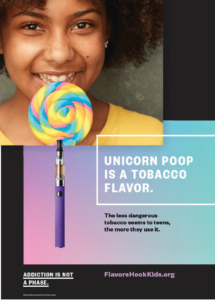
Unicorn Poop is a Tobacco Flavor

I run by this ad at a bus stop near my home several times a week. I’d never given it a second thought until Sequoia Capital partner Carl Eschenbach’s presentation to our class during Week 1.
One distinctive of venture firm Sequoia is that eighty percent of their limited partners are non-profits and charitable foundations. These organizations invest capital in Sequoia’s funds and Sequoia returns profits to them. Sequoia doesn’t invest in tobacco or firearms companies, and so they passed on investing in Juul, maker of vaping products that are extremely popular with American teens.[1] In fact, Eschenbach walked out of his meeting with Juul early because it was clear Juul wasn’t a fit for Sequioa’s investment philosophy. As Eschenbach pointed out, passing on investments like Juul can mean passing on significant upside. Earlier this week, The Information reported that Juul is raising $600 million from hedge fund Tiger Global at a $16 billion valuation.[2] But to Sequoia, it’s more important that it’s LPs would be “proud” of the investments it makes than to maximize returns.
One of my fellow students cited micro-finance as an example of investing for both social and financial returns. These kinds of investments are loans with limited upside opportunity. Micro-loans may have significant social benefits for their target communities, but they don’t return profits at a level required for institutional investors. Sequoia must target growth opportunities in order to distribute profits to it’s LPs.
So how can Sequoia maximize social impact through it’s investments?
First, as Eschenbach discussed, they should avoid investments that produce collateral harm. Juul would argue that it’s products are aimed at existing adult smokers, and in moving smokers away from tobacco products, yield a net positive societal impact. However, the widespread use of Juul among teens, driven by safe-sounding fruity flavors and easy-to-conceal devices, contradicts the stated mission.
Instead, Sequoia should invest in companies where the by-product of the core service produces wide-spread societal benefits. Lyft is a great example (though not a Sequoia company). In an interview with Guy Raz, co-founder John Zimmer shared that their core mission is to improve cities and connect communities.[3] Positive by-products are more efficient use of resources, lower parking requirements, and increased employment opportunities.
Finally, when evaluating investments, it’s critically important that Sequoia understand what distribution strategies it’s companies will employ. Even companies with positive social missions can cause significant harm when they pursue suspect marketing/distribution tactics. Sequoia-backed scooter startup Bird presents a cautionary tale. Like Lyft, they were founded to pursue positive sustainability and community-oriented goals. However, their success has lead to “scooter pollution” backlash in some communities.[4] Likewise, Juul might argue that increased teen usage was an unintended consequence of producing a vape device that looks like a USB stick and flavored like a Starbucks drink. Intended or not, scooter pollution and increased teen vaping should have been predictable and avoided.
[1] https://www.vox.com/science-and-health/2018/5/1/17286638/juul-vaping-e-cigarette
[2] https://www.theinformation.com/articles/tiger-to-invest-600-million-in-juul-as-valuation-climbs
[3] https://one.npr.org/?sharedMediaId=514537998:514555817
[4] http://www.latimes.com/opinion/op-ed/la-oe-jackson-bird-scooter-20180515-story.html
Users who have LIKED this post:
4 comments on “Unicorn Poop is a Tobacco Flavor”
Comments are closed.




Great article! I think one of the more difficult aspects of investing in these companies is understanding how consumers will shift behavior. If Juul did indeed only shift away current cigarette smokers to its vaping products, then they would have provided a net benefit to society. The trouble with Juul, though, is that they are attracting consumers (especially teenagers) who were not smokers to begin with.
There is a similar problem going on with rideshare companies like Uber and Lyft. In some cities, they are facing claims that rather than just moving people from their private cars to rideshares (a net plus for the environment), they’re also pulling people off public transportation into rideshares (net minus) [Source: https://www.mapc.org/farechoices/%5D
Like you mentioned, a lot of thought needs to go into the potential way these products will be used and adopted!
Thanks Claire!
Measuring impacts is hard, isn’t it? In the same interview I linked to above, Zimmer talked about another driver behind Lyft, that they had encountered so many broken public transportation options. IIRC, he said in many places, a bus fare might only cover 30% of the actual costs. So at some level, moving people off those options could be considered a positive. On the flip side, losing low price options would hurt lower income people the most.
This is an interesting article with very good points although I must say I can’t quite determine what it is about Unicorn *poop* that is appealing to teens. At the end of the day, to the companies producing these devices like Juul, it’s more or less about the increase in profits they can generate from creating good marketing campaigns that attract new users and appeal to current users to continue buying/using their products. What might you suggest they do otherwise? If they began naming their flavors “tar”,”ashes”, or “poison”, they certainly wouldn’t be generating as many sales (or would they?).
Interesting article! From a designer standpoint, I find the ubiquitous nature of products like Juul and PAX negates the negative connotation of smoking. Although the effects of vapour are not as harsh as cigarette smoke, it should still be noted that there is still long term damage when ingesting tobacco.